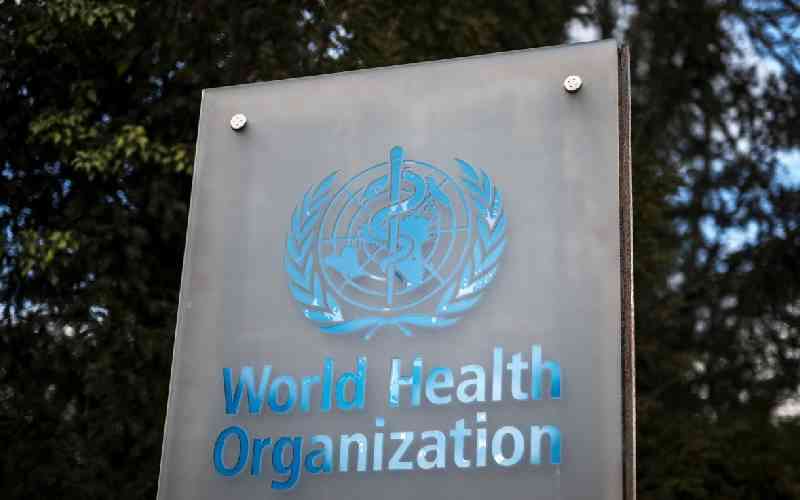
Wangui Kiome recalls how she got sucked into the loop of dietary supplements. She hadn't slept for days, and that night was no different. She spent time scrolling through her phone, and an acquaintance's status on WhatsApp caught her eye.
It read: "Day five of insomnia. Take your iron supplements, beloved!"
Desperate for a solution, Ms Kiome was intrigued and ventured into what became a rabbit hole - the world of dietary supplements.
In a society obsessed with the promise of instant wellness, the reliance on dietary supplements has become almost second nature. Ms Kiome has a shelf full of supplements - mostly multivitamins - and elaborates on their uses and benefits. She spends Sh5,000 on supplements monthly, often opting for value packs, which typically last a month, to save on costs. She gets her supplements without a prescription, having never sought advice from a physician, as they are readily available over the counter.
Unlike Ms Kiome, Daniel Agasa's introduction to dietary supplements stems from the multilevel marketing surge of the early 2000s. His mother's involvement with the multilevel marketing company Forever Living introduced him to the products. As an athlete focused on improving his physique, the allure of using protein supplements to enhance muscle growth and strength was too strong to resist.
"I always wanted to enhance my body, and supplementing protein intake to aid the process was a big influence," he explains.
Over the years, he added supplements to help him deal with burnout. On average, he spends Sh50,000 annually on supplements. He spends more if he has particular health concerns or wants to experiment with a supplement that is not locally available. He imports some of the supplements after buying from various online websites. The Pharmacy and Poisons Board (PPB) guidelines dictate that PPB inspectors inspect dietary supplement products imported into Kenya at the port of entry, and only registered products shall be accepted. However, this rule only applies to large quantities of imported supplements into the country. The small amounts that people import for their use rarely, if ever, attract the attention of the PPB inspectorate.
Like Ms Kiome, Mr Agasa doesn't have a prescription for any of the supplements he takes. He takes supplements to avoid seeing a doctor and gets most of the information about them online or from his friends.
Between 2014 and 2018, the global market size for vitamins and dietary supplements grew at a compound annual growth rate of 6.3 per cent, driven by the food supplements segment. It was projected to grow at a rate of 4.4 per cent between 2018 and 2023, driven by exogenous factors and the evolution of consumption preferences. The COVID-19 pandemic further boosted global interest in vitamins and mineral supplements, with a surge in sales of zinc, vitamin C and vitamin D. Projected growth and increasing demand are attributed to the expanding health industry and growing demand among the rising young and working population who have increased spending on products related to health and well-being.
Each wave of disease, whether lifestyle-related or disease outbreaks like the recent COVID-19 pandemic, sparks misinformation regarding dietary supplements. The notion that supplements are necessary for immune system enhancement fuels widespread misuse and abuse, exacerbating misinformation.
A 2021 study on the use of dietary supplements among adults in Westlands Constituency in Nairobi revealed that 14.4 per cent of participants reported taking supplements, with 70 per cent opting for multivitamins. Most women said they took supplements to address anaemia or osteomalacia (softening of bones). Men primarily used creatine and whey protein supplements to increase muscle mass, enhance strength, and improve exercise performance.
"Dietary supplements are additions to the diet to complete, augment, boost, or amplify the diet. They come in either natural or synthetic form. Correct supplement use begins with two key things: First, proper prescription or guidance from a person trained in health supplements and nutrition, who can give the full dosage and dosage instructions. Secondly, reading and understanding the product label, which should list active ingredients, additions like binders and whatever is contained in the supplement," explains Dr Ashford Mutwiri, the chief pharmacist at the Aga Khan Hospital, Kisumu.
Dietary supplements form part of micronutrients, meaning that even though they are vital to the body's normal function, they are required in tiny amounts. Many people take dietary supplements without a prescription, leading to abuse and misuse. Dr Mutwiri highlights this by pointing out the surge in supplement use during the COVID-19 pandemic.
"Many people took vitamin C (ascorbic acid) for cold or flu. It is an antioxidant, with a recommended dietary allowance of 90 milligrammes for men and 75 or 80 milligrammes for women. The dosage changes depending on whether one is a smoker or if the woman is pregnant. Taking more than the prescribed amount is abuse," he explains.
Abuse occurs when a supplement is misused to achieve a purpose for which it is not intended. For instance, people in sports or bodybuilding use creatine supplements to build muscles, often without consulting a doctor as recommended. In 2017, doctors in Kenya published a medical case of a man who was admitted to a private hospital in Nairobi with a serious liver condition. He improved after the withdrawal of the bodybuilding supplement he had been taking.
Supplements are not considered pharmaceutical drugs, so in many cases, they can be purchased over the counter without needing a doctor's consultation or prescription. However, individuals must be cautious when using supplements because they can interact with other prescribed medications, influence the results of laboratory tests, or affect the outcome of surgical procedures. These interactions could have serious, potentially fatal consequences, particularly if a patient is misusing supplements and not disclosing this information to their healthcare provider. For example, vitamin K can counteract the effectiveness of Warfarin, a medication prescribed to thin the blood and prevent clots.
"When taken together, vitamin K can interfere with Warfarin's ability to prevent potentially harmful blood clots," Dr Mutwiri explains.
"Similarly, if a physician orders a laboratory test to measure potassium levels, the results for a patient taking potassium supplements may show artificially elevated levels of the mineral, leading to a potentially misleading interpretation," says Dr Mutwiri.
"Additionally, supplements such as vitamin E can heighten the risk of bleeding during surgical procedures."
Furthermore, Henry Ngethe, the chairperson of the Nutrition Association of Kenya, warns that prolonged and unregulated consumption of dietary supplements can lead to hypervitaminosis. This condition arises when the body accumulates abnormally high levels of specific vitamins, resulting in toxicity. It is often linked with fat-soluble vitamins A, D, E, and K.
Fat-soluble vitamins, commonly found in our diet, can be stored by the body for up to six months, making supplements unnecessary. Therefore, excessive intake of these vitamins through supplements can lead to acute or chronic hypervitaminosis, which manifests in symptoms like headaches, weakness, and stomach issues. These symptoms resemble those of other conditions which may be overlooked leading to misdiagnosis and inappropriate treatment.
For instance, too much vitamin A can affect bones, lead to liver damage in the elderly and cause birth defects as it affects how the body forms and develops. Similarly, too much Vitamin D can result in enamel defects in teeth.
Mr Ngethe dismissed claims made by the individuals we interviewed, who stated they were taking supplements because they believed that most of the food in Kenya lacked the essential micronutrients required for healthy bodies.
The Ministry of Health, particularly the Department of Nutrition, has policies for fortifying staple foods with necessary nutrients. For instance, in 1978, the government mandated the iodisation of all edible salt, and later, mandatory fortification was extended to staple foods such as maize flour, wheat flour, and vegetable oils.
Additionally, the Ministry of Agriculture has been increasing the nutritional value of most staple crops through biofortification, which is increasing the nutritional value of food through selective cultivation of plant varieties.
"Very many seeds are bio-fortified with micronutrients to address deficiencies. However, the ongoing use of chemical fertilisers and highly acidic soils in various regions of Kenya hinders plants from absorbing certain micronutrients effectively," says Mr Ngethe.
Brenda Ridweys, a clinical nutritionist, says people use supplements incorrectly or excessively because current fads and incorrect information about their benefits influence them.
"Weight loss and bodybuilding are popular trends. Women aiming for a slim body often use supplements promising to burn calories or suppress appetite, while men seeking muscle growth or fat loss turn to muscle-building supplements. Another factor is the misinformation prevalent online on the benefits of these products. Most of the benefits are exaggerated."
The internet remains a hub for misinformation regarding dietary supplements, exploiting peoples' desires for quick fixes to health concerns such as burnout, insomnia, migraines and ageing. The marketing strategy for dietary supplements is often centred around perceived deficiencies, capitalising on them and contributing to the misconception that these products are necessary for overall health. For instance, there is a perception that one cannot take too many supplements, one does not get all the nutrients they need from food, and people need to take supplements after reaching the age of 30, with many blogs pushing the misinformation. While a small subset of the population may benefit from supplements, their widespread use is unsuitable for the general public.
"Dietary supplements are not for everyone because there is a wide variety of food sources, including animal and plant-based options. With all that diversity, when you eat foods from various subgroups, you can meet your daily nutritional needs or what is referred to as the recommended dietary allowance. This is very easy as it only requires people to make basic choices about the types of foods they eat, the amounts and the quality of the food consumed, eliminating the need for dietary supplements," explains Mr Ngethe.

Although myths about supplements have been debunked over the years, misleading claims and unverified anecdotes mean that the true benefits and risks of these products have been obscured, leading individuals to make uninformed decisions.
The industry's focus on sales-driven messaging, promoting unproven benefits, and exploiting health anxieties has led to the proliferation of unnecessary products. Consumers must critically evaluate these claims, and regulatory measures are necessary to ensure transparency and accuracy in marketing dietary supplements. This promotes a more responsible and informed approach to supplementation.
Before beginning any supplement regimen, it's vital to consult a physician or nutritionist to assess individual nutritional needs. Additionally, it's essential to consider the nutrients obtained from food sources before popping a pill or taking supplements.
As dietary supplements continue to populate store shelves and online markets, Dr Mutwiri emphasises the pivotal role of healthcare providers in guiding consumers towards responsible supplement usage.
Understanding each supplement's dosage and duration is key to preventing misuse. Moreover, the decision to use a specific supplement should stem from a comprehensive assessment of an individual's physiological condition by a qualified physician, as certain health conditions may warrant avoiding particular supplements.
Moreover, in the expansive and poorly regulated multi-billion dollar dietary supplements industry, the unsuspecting public could easily fall prey to counterfeit products. Last April, NOW Foods warned its customers against fake NOW Foods supplements being sold on Amazon. The company contacted the American FDA Health Fraud Division and Amazon's Counterfeit Crimes Unit, demanding a recall of the products which were found to contain rice flour and trace amounts of Sildenafil, a medication used to treat erectile dysfunction in men and pulmonary arterial hypertension (a type of high blood pressure that affects the arteries in the lungs and the right side of the heart) in men and women.
To avoid the risk of counterfeits and the risk of misusing supplements, Dr Mutwiri advises getting reliable guidance from health professionals who can provide comprehensive information and support, including how to choose products from regulated companies endorsed by registration authorities.
While there are guidelines for the registration of dietary supplements, Mr Ngethe says the Pharmacy and Poisons Board should implement stricter rules to limit the sale of unregulated nutraceuticals to protect consumers. Nutraceuticals are food or food products like fortified foods, functional foods and dietary supplements that provide health benefits beyond basic nutrition, often marketed as having medicinal or therapeutic properties. The Pharmacy and Poisons Board did not respond to repeated requests for information about the enforcement of checks and balances to protect the public from counterfeits and unregulated products. Officials at the Kenya Bureau of Standards which has a standard for vitamin and mineral food supplements said that the questions were not within their mandate.
Mr Ngethe suggested that the government enhance nutrition by educating the public on the harms of misuse and abuse of dietary supplements, expanding the food fortification programmes and conducting another National Micronutrient Survey to gather updated data. The last survey was done in 2011.
Additionally, he recommended the employment of more nutritionists, including at the county level, to improve public access to nutrition services at community and household levels. According to the 2023 Economic Survey, Kenya only has 4,235 nutritionists, meaning there is only one nutritionist per 11,813 people.
This article was produced as part of the Aftershocks Data Fellowship (22-23) with support from the Africa Women's Journalism Project (AWJP) in partnership with The ONE Campaign and the International Center for Journalists (ICFJ).
 The Standard Group Plc is a multi-media organization with investments in media
platforms spanning newspaper print
operations, television, radio broadcasting, digital and online services. The
Standard Group is recognized as a
leading multi-media house in Kenya with a key influence in matters of national
and international interest.
The Standard Group Plc is a multi-media organization with investments in media
platforms spanning newspaper print
operations, television, radio broadcasting, digital and online services. The
Standard Group is recognized as a
leading multi-media house in Kenya with a key influence in matters of national
and international interest.











